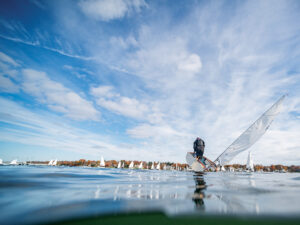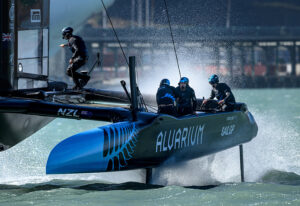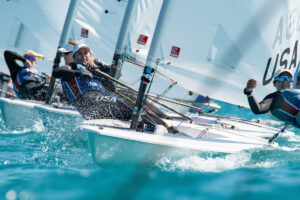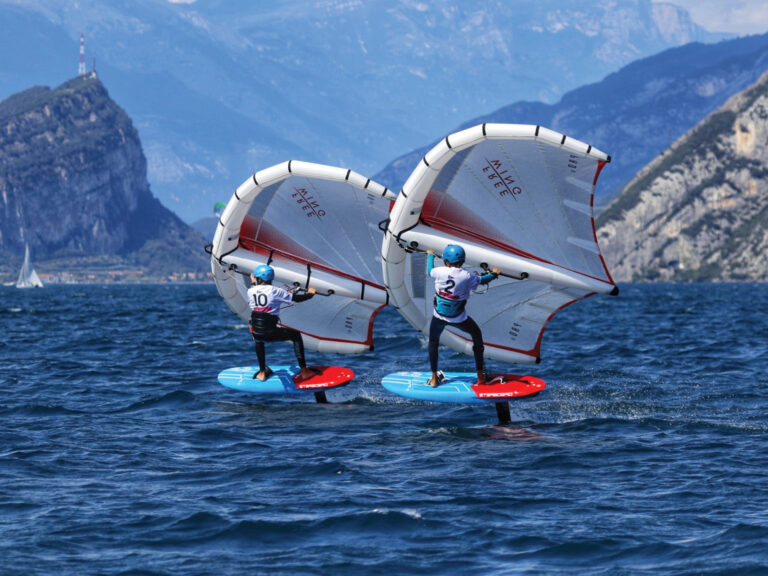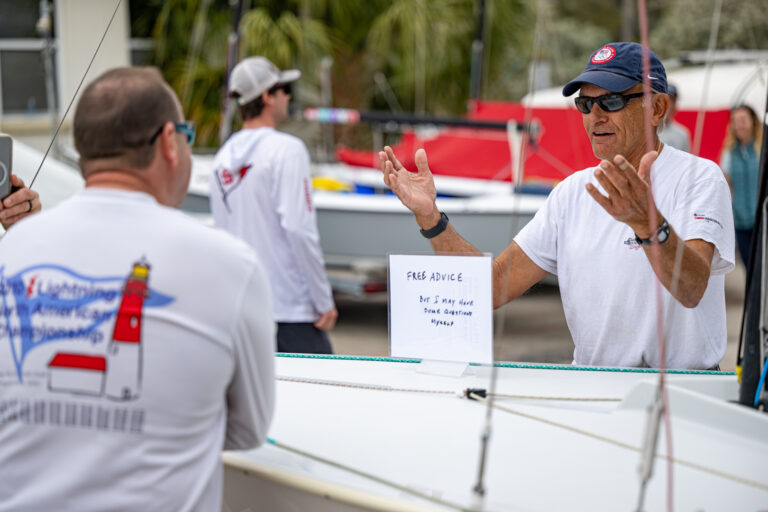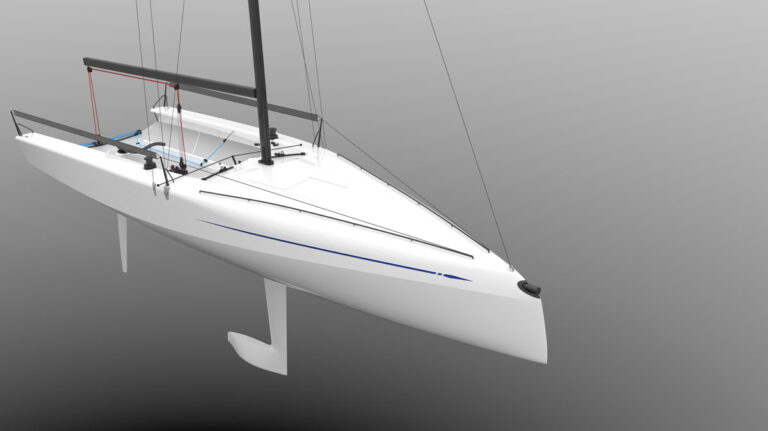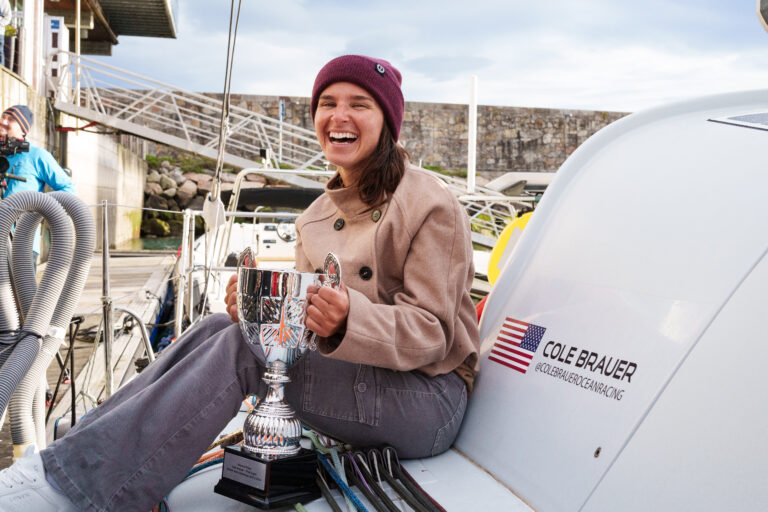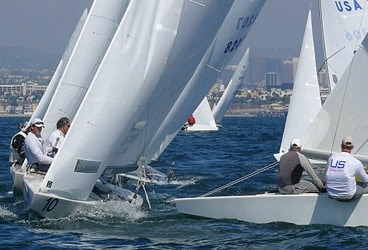
DaneSperry368
When Austin Sperry’s future father-in-law started spinning tales of his past accomplishments as a sailor, he did what just about any smart young man in his position would do. He kept his opinions to himself.
“He said, ‘Hey, I won this and that,'” says Sperry of his initial sailing conversation with John Dane III. “[I thought,] ‘OK, dude,’ but I didn’t pay much attention.” Sperry, a 29-year-old California native, had done enough big-time keelboat sailing-he sailed his first Bacardi Cup in Stars at age 14-to be able to put into perspective the current and former skills of this 50-something yacht builder with the Southern drawl. Or so he thought.
After they sailed against each other at the 2004 U.S. Olympic Trials, Sperry finishing 10th while Dane was 13th, Dane suggested they do a little family bonding at the Star Western Hemisphere Championships in the Bahamas in April 2005.
Again, Sperry nodded his head and kept his reservations quiet. “We went to the Bahamas, big waves, big breeze,” he says, “I’m thinking, ‘Man, this old guy, he’s going to struggle.'”
Dane did nothing of the sort, finishing second in the 25-boat fleet to Paul Cayard, who was riding the wave of an Olympic campaign that had concluded with a fifth at the Athens Games. Sperry’s opinion of the old guy changed in a hurry.
That regatta in the Bahamas kicked off an unlikely Olympic campaign. Two and a half years later, the protagonists pulled into a corner of the labyrinth Marina del Rey harbor with a pair of tickets to Qingdao next summer firmly their grasp.
Among his 14 teammates on the U.S. Sailing Team-with just two teams in the running, US SAILING opted against a Yngling Trials and will name the team after the 2008 World Championships in February-Dane stands apart. At 57, he’s the oldest member of the team by 17 years, and has more of his life behind him than in front of him. He has earned a PhD in civil engineering, married off a daughter, and achieved no small amount of success in business. Trinity Yachts, for which he serves as the president and CEO, is one of the world’s foremost builders of megayachts. With a queue of 20 or so projects, each over 150 feet, business is quite good and will be that way for some time.
But for all his success in the business world, Dane hadn’t been able to shake his Olympic dreams. Despite what his son-in-law might have first thought, before Dane was a husband, a father, and a millionaire, he was one heck of a sailor. A junior champ and a three-time All-American at Tulane, Dane sailed his first Olympic Trials in 1968, finishing second as a member of O.J. Young’s Dragon crew.
He followed that up with a fourth in the Soling class in 1972 and then a third in the Finn in 1976. He added another fourth to his resume in the Star in 1984, but as Olympic sailing progressed toward a professional sport, and his career commanded more of his time, Dane slipped off the pace. He was seventh in the Star in 1996.
Dane’s 13th at the 2004 Trials in Miami might’ve been his swan song if not for the young man his daughter had begun dating. “I probably wouldn’t have done it,” he says. “It’s a lot of time, a lot of effort, a lot of expense. The early success led to, ‘We can do this.’ We had some great regattas, then we won the Bacardi Cup with 90-something boats, we won the Spring Championships, so we knew we could win. So we just said, ‘Let’s just outwork everybody.'”
With Sperry providing the youthful enthusiasm, and Dane, the steady, experienced hand on the tiller and the financial backing, they did everything they could. It didn’t hurt that two of the top U.S. Star skippers were sailing America’s Cup boats through early summer. While Andy Horton and Mark Mendelblatt were bashing around the Med, Dane and Sperry were holed up in Marina del Rey, sparring with the likes of Robert Scheidt, two-time Laser gold medalist and reigning Star world champ, and Olympic veteran Marc Pickel, of Germany.
All this training appeared to pay off immediately as Dane and Sperry won the first race of last October’s Trials. But a 12th in Race 2, a sixth in Race 3, and an eighth in Race 5 pushed them down the standings. They made a brief appearance in the top 3 after three days of racing, but dropped out the following day.
After four days of sailing, Mendelblatt and Magnus Liljedahl had what looked to be a solid grip on the lead. They were 10 points up on second, had finished no worse than eighth in any race, and had top three finishes in six of nine races.
But Liljedahl, who won a gold in the Star in 2000 with an improbable final-race comeback, knew this fleet was too talented, this regatta too long, to count on anything except more difficult racing. “It’s just a battle,” he said after Day 4. “It could change quickly. But I think the lay day couldn’t have come at a better time for us because we sort of had a bad day. So I think that day off will really help us recharge. It’s hard to be focused this whole time and not have any letdowns. If today was a letdown, with a 2-5-6, then we have to accept that and be happy.”
However, it proved to be the beginning of a trend. After averaging 3.5 points per race through the first nine, Mendelblatt and Liljedahl averaged a seventh in the final seven races.
This allowed Dane and Sperry, and George Szabo and Andrew Scott, who had the most consistent regatta of the contenders, to close on the lead. With three races remaining, Mendeblatt and Liljedahl led by 1 point over Dane and Sperry and 2 points over Szabo and Scott. With just one race left, it was Szabo and Scott in the lead by a point over Dane and Sperry; Mendelblatt and Liljedahl clinging to a slim hope 5 points back.
While Mendelblatt and Liljedahl favored the pin end of the starting line for the final race, the other two boats battled for position near the boat end. Szabo and Scott initially had the controlling leeward position, however, that changed quickly as the boats sheeted in.
“We started just to leeward of Dane and the breeze increased about 5 knots and went 20 degrees right so it allowed him to live and get into a bow-down mode and get over the top of us,” says Scott. “Basically that was our race because we had to tack out of there and start playing the right a little bit. At the top of the leg the left came in strong and we were hung out to the right.”
While Mendelblatt and Liljedahl faded on the second beat, Szabo and Scott eventually got close enough to make Dane and Sperry nervous. But despite sailing defensively on the final run-and with the mainsheet cleated to avoid drawing the ire of the judges-Dane and Sperry eeked past one last boat to take the gun, the regatta, and the Olympic berth.
Even after a long tow in, a dockside champagne celebration, and plenty of hearty congratulations from family, friends, competitors, and spectators, Sperry struggled to put the win into perspective. Dane was more composed. Four decades is apparently plenty of time to work on a victory speech. “I’ve been 39 years close and this is just an unbelievable end to a dream,” he said. “This is great.”
Past the Wire
Born four years apart and raised on opposite coasts, Brad Funk and Andrew Campbell followed similar paths to the top of the U.S. Laser class. They each excelled as youth sailors, then jumped into the Laser and quickly became the stars of their respective age groups. Each took it on the chin in their first Olympic Trials experience. Funk, the older of the two, completed half the races at the 1996 Laser Trials and finished second to last while Campbell was 25th of 32 at the 2000 Laser Trials. Each took the time to have a successful college sailing career at a Mid-Atlantic university.
Their age difference allowed each to be considered the best Laser sailor among his peers. However, when Campbell graduated college in the spring of 2006 and joined Funk on the international Laser circuit, their paths converged, both focused on the lone U.S. Laser berth at the 2008 Olympics. At the Pre-Trials in October 2006, they finished the four-day regatta even on points; with third place a ways back. Campbell won the tiebreaker.
After both spent a year on the international circuit-and consistently were the top-two U.S. finishers in the important events-it was hard to imagine anyone else wining the Laser Trials.
Yet Clay Johnson-just a few months out of Harvard University-won the first two races. After four races, Campbell looked at the results and stated that all the hype promoting the one-on-one battle between him and Funk was just that.
“The media tried to make it a little more of a two-boat race, it keeps it simple for everybody,” he said. “There are a lot of really good sailors out here. We knew what to expect; we knew there would be five to six boats that could win races and three or four of us that would be in it.”
However, no sooner were the words out of his mouth than the other top competitors started to falter. After eight races, Funk had 15 points, Campbell 18, and third-placed John Pearce had 36. After 10 races the gap between Funk and Campbell and the rest of the fleet had grown to 32 points and the match race was on.
Funk carried the lead into the penultimate day of the regatta, when he finished behind Campbell in three shifty races. But the Florida native roared back in Race 15, carrying Campbell above the windward mark-a confrontation that resulted in both sailors filing protests-pushing both of them out of the top 10, and then grinding back into the lead on the second loop to win the race, while Campbell finished seventh.
Though Funk carried a 1-point lead into the final race, it was essentially a dead heat as Campbell would win the tiebreaker. Campbell got the early lead in the race, though they were overlapped around the first leeward mark. “He and I sailed all the way out to the right-hand corner. We were bow even for six minutes on port and he finally ducked down and tacked and I tacked on top of him. Down the reach, I was able to get over one boat and put a blocker between us, but down the run, he passed that boat no problem. That last reach I had a three- or four-boatlength lead, and that’s how we finished, three boatlengths apart, 10 second, after 16 races.”
Fittingly, the two sailors finished with the exact same point total, 44 points, with Campbell winning the tie-breaker because he’d won five races to four for Funk. However, there was still a matter of the protest.
“I was nervous, there’s no doubt about that,” says Campbell, who didn’t file his protest. “But I was confident that I’d done as much as I could on the water to stay out of the way. I think what got everyone on edge was we spent an hour in the room and another 40 minutes waiting for the decision to come down.”
The jury dismissed the protest, and Campbell was able to officially celebrate realizing his Olympic dream.
While Campbell was celebrating with family and close friends, 3,000 miles away the jury at the Women’s RS:X Trial was preparing for a hearing with similar ramifications.
With a first in the last race, Farrah Hall, 27, from Annapolis, Md., had done everything she could on the final day to win the regatta. While Hall, at the time oblivious to what was unfolding behind her, chased after her ailing coach boat, Nancy Rios, who’d led the regatta going into the last race, crossed the line in fourth, in tears, and with an 8-inch tear in her sail. Rios was now in second by 1 point.
Rios had won the Pre-Trials in October 2006 and entered the Trials as a favorite. However, she was unprepared for the pressure of the event, and surprised by the performance of Lisa Kremer, an unknown teenager from Worthington, Minn., who had a first and two seconds in the first three races and led after the second day of sailing, but faded from contention down the stretch.
“I was just a little overwhelmed,” says Rios of the first half of the regatta. “Everyday after racing I wasn’t thinking about what I did right and what I had to fix. I was just thinking, ‘I had such a bad day, I’m so bad.’ The focus wasn’t there; my mind wasn’t ready.”
After reassessing her approach during the layday, Rios won the next six races, with Hall second in five of them, and took a 3-point lead into the final two races. Hall won the first race on the final day, with Rios second, to narrow the margin to 2 points.
At the start of the final race, Monica Wilson tried to cross the fleet on port tack and ended up fouling three boats in the process, including Rios and Hall. Rios took the worst of it, dropping her sail briefly and, more significantly, sustaining the tear in her sail.
While Hall sped around the course for her second win of the day, Rios, upset and worried that her sail might rip further, could only manage a fourth.
“My world just feel apart,” says the diminutive Rios. “I was so mad. Once I got closer to the harbor I was thinking there has to be something they can do, something’s wrong here, it’s not fair. I didn’t really have time to think about it too much because I got drug tested right away.”
When she gathered her wits, Rios applied for redress. While that hearing was going on, Hall, now thinking she’d won the berth, spoke with reporters and enjoyed her accomplishment. Then it was her turn to have her world cave in as the jury awarded Rios averaged points for the final race, meaning Rios had now won the regatta by a point. “I got dragged out of the shower basically to learn the decision of the jury,” says Hall, “and then 5 minutes later they started the awards ceremony. From being completely thrilled, I’d accomplished a goal I’d been striving for, for a long time, to I can’t event say what the emotion was, it was just numb shock.”
Hall doesn’t fault Rios for filing for redress. She is, however, upset that the hearing was conducted without any other sailors present and that, given the importance of the decision, she wasn’t allowed to speak on her behalf. She admits she missed an opportunity to re-open the hearing that evening. However, she is determined that her side of the story be heard and as this issue went to press was awaiting a grievance hearing with the United States Olympic Committee. In the meantime, both she and Rios are training and planning as if they’re going to the Olympics. “Regardless,” says Hall, “I’m going to keep sailing.”

